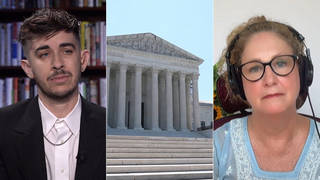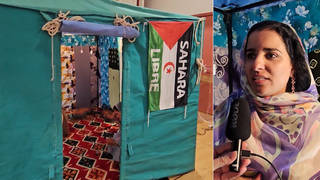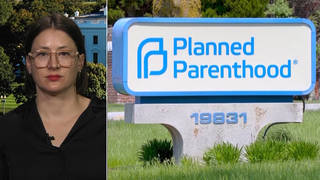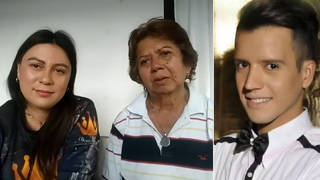
Topics
Guests
- Adam Hochschildprofessor at the Graduate School of Journalism, University of California at Berkeley. He co-founded Mother Jones magazine. He is the author of eight books, including King Leopold’s Ghost and To End All Wars: A Story of Loyalty and Rebellion, 1914-1918. His new book is called Spain in Our Hearts: Americans in the Spanish Civil War, 1936-1939.
As Republican presidential hopeful Donald Trump has catapulted the issue of fascism into the mainstream U.S. political realm, we turn to best-selling author Adam Hochschild, who has just written a remarkable, sweeping history of the Spanish Civil War. The book is called “Spain in Our Hearts: Americans in the Spanish Civil War, 1936-1939.” It tells the story of how the Spanish Civil War captivated the world with volunteers flooding to Spain to bolster the democratic government’s efforts to stave off a fascist uprising led by Francisco Franco and aided by Hitler and Mussolini. Some 2,800 Americans went to Spain as volunteers in the fight against fascism, and nearly a quarter of them perished there. The Americans were known as the Abraham Lincoln Brigade. After two-and-a-half years of fighting, the fascists were able to declare victory on April 1, 1939. World War II began shortly afterward. Adam Hochschild is the author of eight books, including “King Leopold’s Ghost,” “To End All Wars: A Story of Loyalty and Rebellion, 1914-1918” and now “Spain in Our Hearts: Americans in the Spanish Civil War, 1936-1939.”
Transcript
NERMEEN SHAIKH: We spend the remainder of the hour with best-selling author Adam Hochschild, who has just written a remarkable, sweeping history of the Spanish Civil War told through a cast of a dozen characters, including Ernest Hemingway and George Orwell. The book is called Spain in Our Hearts: Americans in the Spanish Civil War, 1936-1939. The book tells the story of how the Spanish Civil War captivated the world, with volunteers flooding to Spain to bolster the democratic government’s efforts to stave off a fascist uprising led by Francisco Franco and aided by Hitler and Mussolini. Some 2,800 Americans went to Spain as volunteers in the fight against fascism, and nearly a quarter of them perished there. The Americans were known as the Abraham Lincoln Brigade. After two-and-a-half years of fighting, the fascists were able to declare victory on April 1st, 1939. World War II began shortly afterwards.
Earlier this month, Delmer Berg, the last known surviving veteran of the Abraham Lincoln Brigade, died in his home in California at the age of 100. Berg was also a longtime labor organizer who worked with the United Farm Workers. He recalled his decision to fight in Spain in an interview in 2013.
DELMER BERG: I was very affected by the fascist attempt to take over in Spain. I can tell you why: I just didn’t like the idea. And that was my political understanding: I didn’t like what them SOBs were doing. So, I bought out of the Army. Then I didn’t know how to get to Spain, 'til one day I was going to work in Hollywood as a dishwasher in the Hollywood Roosevelt Hotel, and I see on the side of a building: “Friends of the Abraham Lincoln Brigade.” I turned the corner, went up there, told them, ’I want to go to Spain.'”
AMY GOODMAN: Most of the people Adam Hochschild profiles in his new book fought against fascism and in defense of democracy. But some supported Franco, including the CEO of Texaco, who supplied the fascists with fuel for their military exploits.
We’ll talk about this and more with Adam Hochschild, now in our studio. He teaches at the Graduate School of Journalism at the University of California, Berkeley, co-founded Mother Jones magazine. He’s the author of eight books, including King Leopold’s Ghost and To End All Wars: A Story of Loyalty and Rebellion, 1914-1918. His new book, just out, Spain in Our Hearts: Americans in the Spanish Civil War, 1936-1939.
Welcome back to Democracy Now!
ADAM HOCHSCHILD: Great to be with you.
AMY GOODMAN: It’s great to have you, Adam. Start off with why you decided—I mean, I don’t know if you knew how relevant fascism would become in this election year, specifically being addressed by some of the candidates, but before we go to that, why you decided to write this book.
ADAM HOCHSCHILD: I had always been interested in the Spanish Civil War. When I was in my twenties, one of my first jobs was as a reporter for the San Francisco Chronicle, and, as it happened, there were two other reporters on the newspaper, each 30 or 40 years older than me, who were veterans of the American—of the Spanish Civil War. They were Americans who had volunteered to fight there. And when times were slow in the newsroom, I used to ask them about their experiences. Later, of course, I read Ernest Hemingway, I read George Orwell, visited Spain, grew more fascinated by the war and, a few years ago, finally decided, well, it’s time to write a book about this. And I discovered all kinds of things that—some of which I think had not been well known before. I had just a fascinating time doing it.
NERMEEN SHAIKH: And what about the title of your book, Spain in Our Hearts?
ADAM HOCHSCHILD: It comes from a quotation from Albert Camus, which I should know by heart by now but don’t. But it goes something like—he said it some nine or 10 years after the war: “Men of my generation have always had Spain in our hearts. There we learned that you could be right but still be defeated, that courage was not its own reward.” And it goes on like that.
AMY GOODMAN: So, thousands of Americans went to Spain to fight. Explain who they were—this is before World War II—why they did it. And do you think this could have stopped World War II and the rise of Mussolini and Hitler?
ADAM HOCHSCHILD: Big question. Roll back the clock for a moment to the mid-1930s. Fascism is on the rise everywhere. Mussolini has just conquered Ethiopia. Hitler is making noises about taking over Eastern Europe. He clearly has his eyes set on capturing a big slice of Russia. This is an aggressive movement. All of a sudden, in Western Europe, in a democracy, Spain, which had had an elected government since 1931, there is a rising of right-wing generals, from whom a leader quickly emerges, a tough-talking young general, Francisco Franco. And they try to take over the country. And they clearly want to impose a regime that will suppress all trappings of democracy—free trade union, free press, none of that. And it was very clear who their friends were, because immediately Hitler and Mussolini began sending large quantities of help—airplanes, pilots, tanks, tank drivers, artillery, military advisers, equipment of all kinds. And Mussolini sent 80,000 ground troops, as well. So, from all over the world, people began coming to Spain as volunteers to fight to defend the republic.
From the United States, some 2,800 Americans went, before long—the largest number of Americans who have ever gone to fight in somebody else’s civil war. And I think they went, above all, because of the danger of fascism. One young New Yorker, Maury Colow, said later, “For us, it was never about Franco. It was always about Hitler.” Another young American, Hyman Katz, who was actually a 23-year-old rabbi, wrote to his mother from Spain shortly before he was killed, saying if he hadn’t come to Spain, he said, “for the rest of my life, I never could have forgiven myself for not waking up when the alarm clock rang.”
NERMEEN SHAIKH: Well, in fact, close to half of all the American volunteers were Jewish. Could you explain what you think accounts for that?
ADAM HOCHSCHILD: A think a couple of things. Above all, the fact that Hitler was rapidly rising. He had come to power in Germany in 1933, was making no secret that life was going to be very, very tough for the Jews. The full extent of the Holocaust, of course, nobody could imagine at that time, but it was clear terrible things were coming. Jews were also heavily overrepresented in the left wing in the United States. And the organization of most of these volunteers who went to Spain was orchestrated by the Communist Party, in this country and in the other countries the volunteers came from. Not all of them, though, were communists. Many came from other strains of the left, as well.
AMY GOODMAN: Let’s go to a few of them. I want to turn to another veteran of the Abraham Lincoln Brigade, the late Moe Fishman. I spoke to him in our firehouse studio in 2007.
MOE FISHMAN: The International Brigade, of which we were a part, consisted of about 40,000 to 45,000 volunteers from 52 countries who came to the aid of the Spanish Republic, and I want to emphasize “came to the aid of.” It was the Spanish Republic and their people who fought this war and deserve the major credit for the big fight that they put up, which gave the democracies a two-and-a-half-year window of opportunity to change from a policy of appeasing fascism, led by Chamberlain of Britain and subscribed to by Roosevelt, to one of actively fighting fascism. If they had actively fought fascism in 1936-’39, we would have stopped Hitler, and there would have been no World War II.
AMY GOODMAN: How would you have stopped Hitler? This was Spain. This was Franco. How would you have stopped Hitler?
MOE FISHMAN: Well, Hitler had been appeased by—they permitted him to re-arm Germany, and it was done with the finances of both Britain and the United States, the financiers—financed it on credit—that permitted Hitler to march into Austria. And then Spain came along, and they were letting him do as he felt in Spain with this policy of appeasement. If they had turned to fighting fascism and opposing what he was doing, Hitler would not have attempted a two-front war, which he was trying like mad to avoid. He would not have been armed as much as he became armed, when he conquered one country after another and built a war machine that almost succeeded in conquering the world. And he would have been stopped if there had been a conflict, and there might have been. He might have been rash enough to start something there. He would have had a two-front war to confront, and it would have been a minor kind of war. It would not have been World War II, where fascism almost won—and 60 million dead and destruction beyond compare. And, no, there would have been no Holocaust, if Hitler had been stopped in Spain in 1936-’39.
AMY GOODMAN: That was Abraham Lincoln Brigade veteran Moe Fishman speaking in April of 2007. He died four months later at the age of 92. That same year, I interviewed another veteran of the Abraham Lincoln Brigade, Clarence Kailin, in Madison, Wisconsin.
CLARENCE KAILIN: We were fighting against fascism. And we were political enough to understand that, so it wasn’t for an adventure, and it wasn’t for money. It was—it was fighting against Italy and Italian fascism and German Nazism, is what it was about. And we felt that if we lost the war, that World War II was pretty much inevitable, which is what happened. And it happened because Britain and France and the United States refused to give us any help at all. And so, we fought barehanded at times.
AMY GOODMAN: That is—was Clarence Kailin speaking in 2007. I talked to him in Madison, Wisconsin. He died two years later at the age of 95. Adam Hochschild?
ADAM HOCHSCHILD: A moving story about Clarence Kailin. When he enlisted to fight in Spain, he went to Spain together with a schoolmate of his from Wisconsin, a man named John Cookson. Cookson, who was a physics instructor at the University of Wisconsin, was killed, one of the last Americans killed in Spain in the late summer of 1938, and was buried there. And Cookson’s grave is the only known grave of an international volunteer in Spain that survived destruction under Franco and his nationalists during the long period of Franco’s rule. It was hidden by Spanish villagers behind some bushes in a little town called Marsa. It was moved at one point, so I’m not sure the gravestone is actually where the body is right now. But it was kept, tended, flowers put there, carefully hidden for decades afterwards. Clarence Kailin went back several times in later years to visit his friend’s grave and asked that when he died, he be buried next to it. So, today, you can find these two gravestones side by side.
AMY GOODMAN: When Clarence talked about John Cookson, he wept. Adam Hochschild is our guest. His book is Spain in Our Hearts: Americans in the Spanish Civil War, 1936-1939. When we come back from break, we will ask him about the CEO of Texaco. What did Texaco have to do with the rise of fascism? Stay with us.
[break]
AMY GOODMAN: “Jarama Valley” by Woody Guthrie. Jarama Valley, the first big battle of the Spanish Civil War that Americans participated in. Again, more than 2,700 Americans went to fight in the Spanish Civil War.













Media Options